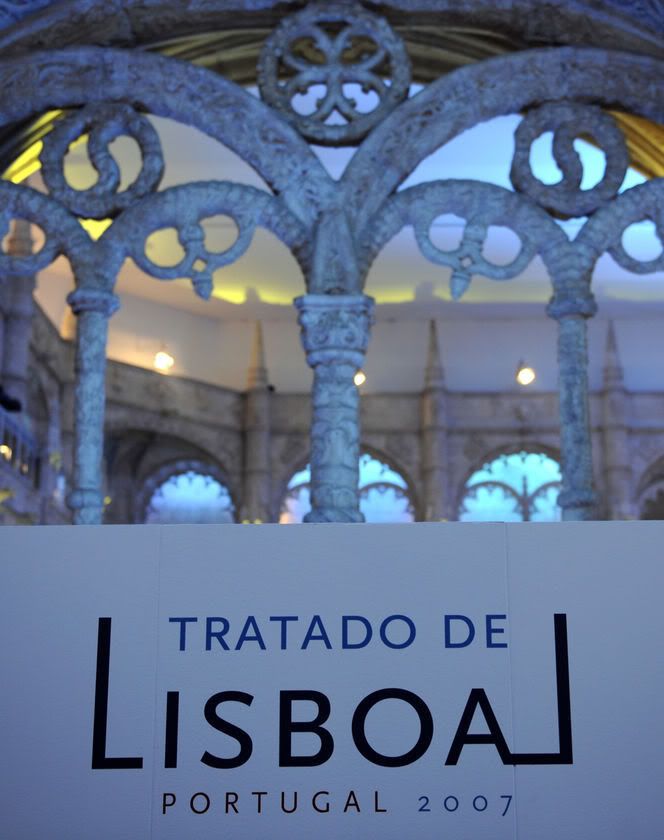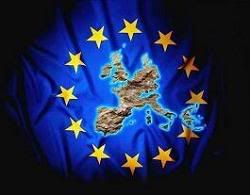Thursday, 21 February 2008
Wednesday, 20 February 2008
More Than The Sum Of My Words
Some Poems I Think...
the red-orange glow
of a trap i don't know
and nothing to compare
i know i'm dying
but i'll keep on trying
to sweep away the snare.
_______________
Les Mondes Sans Yeux
please wake up
please see
please hear
you have beauty & magnificence
you have every right
to be whomever you like
but don't fall
you don't need to fall
build steps
not walls
you have love & significance
you have power
and the right to life
live
breathe
see
and hear
you have as much right as any
to be here
_____________
the door of the cage
is open
but the birds have stayed inside.
______________
Never
to the penned
and penniless revolutionaries
of this world
i raise my morning cheer
i hold aloft my woken dreams
in the hope that all shall hear
to pain unknown
and voiceless beats
beaten down by law
to break the camels back
we need only one more straw.
______________
rain like an army
a bombarding liquid song
i shelter in an archway
and dream of summer sun
raining like a fever
i'm soaked, i'm stoned
brain dripping and luminous
whitewashed & honed.
_______________
in search of foundation
a step to the side
in my mind forward
but to others just a ride
in need of resistance
a revolution to the core
to find the reality
that's been buried by their war.
_____________
As deep as any ocean,
but of falling autumn hue
I jump into your eyes,
and dance away the blues.
______________
dawns ass cracks wide open,
revealing a mighty sphere of
burning gas.
all of the wage slaving whores scream in unison -
'Get us the fuck outta here....!'
_______________
A Path Ethic
Pseudo importance
and soul killing rules
regulate
our every move
binding
officious ropes
choke our throats
denying the escape of truth
dogmatised
terror inducing religion
and filth
squeeze our true spirit from us
slimy politicians
become engorged
scraping the last pieces of flesh
from the bones of the starving
as we rot away
in their broadcast armchairs.
__________
Pigs
and the world is full of death today,
as it is every day.
i've got my own deaths to deal with,
but i try to make them small.
i write them down,
on pieces of paper,
and throw them from a moving car.
there's so much weight,
that my shoulders hurt.
i feel like i want my spare time to be spent
fucking, drinking,
laughing and writing.
there's just too much bullshit,
too many small deaths that are allowed
to roam free and shoot moments of happiness.
but there's a bigger picture.
an army of poisonous swine,
creeping in every cup of water
and every mainstream broadcast.
so i dedicate my time,
between enlightenment and wine,
and the destruction of these pigs.
________
Can you feel it?
The time has come,
the light is shone,
born freedoms lay in mourning
Arise from the dirge,
this deathly stinking verge,
herding us to their calling
Primal resurrection,
from this myre of decption,
raise us to our truth
No more shall we sit,
at your table of shit,
slaughtering our youth
Imbibe no more,
their repugnant lore,
but wake and see the might
We the people,
not the sheeple,
shall awake and win this fight
freedom in sight,
bated breath,
heartbeats thunder like drums
minds collide,
great forces meet,
the worm begins to turn
fleeing oppression,
forcing aggression,
to bow to it's knees
we as one,
begin to hunt,
no masters shall we please
force their hand,
wake the many,
numbers are the key
alive! we cry,
awake! we scream,
the dawning of a future,
free.
Blooddha '08.
Posted by
Bloodha
0
comments
![]()
![]()
The Irish Government Is Poisoning You

The Irish Government (wankers) called for a ban on bottled water yesterday, stating that they were environmentally unsafe. They told the reporter that we should all drink tap water. Fluoridated, poisonous, brain, kidney, thyroid damaging tap water. At the meeting they had, low and behold, they were drinking bottled water. Canvas your local politicians, newspapers, radio stations & complain about this blatant attack upon our health. Get fluoridated water banned for good.
The now minister for the environment John 'Bend Over For Bertie & The CFR' Gormley(Gormless), who is advocating drinking tap water,was once against such a dangerous activity.
In this vid he debates with Dr.Jacinta 'Spawn Of Satan' McLoughlin about the
dangers of Fluoride.
How things change, eh?
Once becomming part of the Government (Enslave & Poisonment),he completely changes his mind & tells us that he's going to ban that which isn't destroyed by fluoride.
'Ah, go on, ya will, drink dat poison now and sure you'll be grand,so ya will.'
Go fuck your CFR and Bilderberg lovin' self, you wormy fuck.
For more see Here.
Posted by
Bloodha
1 comments
![]()
![]()
A Real Social Networking Site
At last! A real networking site for real truth.
I urge you all to join this one.
This site offers a real chance for all truthers,
revolutionaries, freedom-seekers, carers,
greeners, artists, musicians, film makers,
activists & good people to get
together & organise.
Click Here to join now!
This site is censored on MySpace!
Rupert Murdoch now owns MySpace.
Vote with your fingers & go join InfoWars now!
Show Murdoch & his NeoFascist cronies how you feel.
Posted by
Bloodha
0
comments
![]()
![]()
Tuesday, 19 February 2008
The Truth About The Treaty
WHAT THE EU TREATY OF LISBON DOES (legally accurate) *
National Platform EU Research and Information Centre
15.02.2008
This document has been prepared by the National Platform EU Research and Information Centre, 24 Crawford Ave., Dublin 9; Tel: 01-8305792; Secretary Anthony Coughlan. It has been vetted for legal accuracy by authorities on Irish constitutional and EU law. Please copy it or adapt it as you please and pass it on to others, without any need of reference to its source.
“France was just ahead of all the other countries in voting No. It would happen in all Member States if they have a referendum. There is a cleavage between people and governments…There will be no Treaty if we had a referendum in France, which would again be followed by a referendum in the UK.”
- French President Nicolas Sarkozy, at meeting of MEP Group leaders, EUobserver, 14 November 2007
“Public opinion will be led to adopt, without knowing it, the proposals that we dare not present to them directly … All the earlier proposals will be in the new text, but will be hidden and disguised in some way.”
- Former French President V.Giscard D’Estaing, Le Monde, 14 June 2007
“The substance of the Constitution is preserved. That is a fact.”
- German Chancellor Angela Merkel, speech to the European Parliament, 27 June 2007
An EU Constitution: The Treaty of Lisbon is a revamped version of the treaty which gave the EU its own Constitution over and above the constitutions of its Member States, but which the peoples of France and Holland rejected in referendums in 2005. Instead of accepting that decision the EU Prime Ministers and Presidents decided to give the EU a constitution indirectly rather than directly, but not to call it a constitution, and on no account to hold referendums on it for fear people would reject it again.
Why an Irish referendum?: A referendum must be held on it in Ireland however because the Supreme Court laid down in the 1986 Crotty case that sovereignty in this State rests with the Irish people and that only they can surrender sovereignty to the EU by referendum, or else refuse to surrender it as the case might be. The purpose of the referendum would be to change the Irish Constitution so as to make EU law superior to Irish law in the areas set out in the Lisbon Treaty.
Lisbon gives the EU a constitution indirectly rather than directly: The two current basic European Treaties are called “The Treaty on European Union (TEU) and “The Treaty on the Functioning of the Union”(TFEU). These two documents include all the previous treaties from the 1957 Rome Treaty to the 2002 Nice Treaty. The EU Constitution which the French and Dutch rejected would have repealed these two treaties and replaced them with a document called “A Constitution for Europe”. The Lisbon Treaty implements 96% of the legal content of this “Constitution for Europe” by proposing amendments to the two basic EU Treaties and thereby turning them into the effective constitution of the new Federal EU that Lisbon would bring about.
The following are the main changes Lisbon would make in the EU’s two constituent Treaties:
1. Lisbon makes the EU Constitution superior to the Irish Constitution in all areas of EU law: We would still keep the Irish Constitution, but “Declaration 17 concerning Primacy”, which is attached to Lisbon, makes clear that EU law would have primacy over and be superior to the Irish Constitution and laws in any case of conflict between the two. EU law and national law deal with different areas and matters, but the EU now makes the majority of our new laws each year. The Lisbon Treaty would give the EU the power to make laws binding on us in many new areas and would take that power away from the Irish Dáil and from Irish citizens who elect the Dáil.
2. Lisbon gives the EU the constitutional form of a supranational European Federal State and turns Ireland and the other Member States into regions or provinces of this Federation: It does this in three legal steps: (a) giving the new European Union which it would bring into being its own legal personality and independent corporate existence for the first time, separate from and superior to its Member States; (b) abolishing the European Community which we have been members of since 1973 and replacing it with the new Union; and (c) bringing all spheres of public policy either actually or potentially within the scope of the new Union. From the inside this new post-Lisbon EU would seem to be based on treaties between States. From the outside it would look like a State itself. Lisbon would then make us all real citizens of this new Federal EU for the first time, owing to it the normal citizen’s duty of obedience to its laws and loyalty to its authority. One can only be a citizen of a State and all States must have citizens. We would still retain our Irish citizenship, but the rights and duties attached to that would be subordinate to those of our EU citizenship in any case of conflict between the two. The EU’s authority would be superior. Post-Lisbon, we would be like citizens of Virginia vis-a-vis the USA or citizens of Bavaria vis-a-vis Federal Germany. This new Federal EU would sign Treaties with other States, would have its own political President, Foreign Minister and foreign and security policy, its own diplomatic service and voice at the UN, and its own Public Prosecutor. It would make most of our laws and would decide what our basic rights are in all areas of EU law.
3. Lisbon shifts influence over law-making and decision-taking in the EU towards the Big States and away from the smaller ones like Ireland: It does this by replacing the voting system for making EU laws that has existed since the 1957 Rome Treaty by a primarily population-based system which would give most influence to the Member States with big populations and reduce the influence of smaller ones like Ireland. Under Lisbon a “weighted” or “qualified” majority vote (QMV) for making EU laws in future would be 15 States out of 27 as long as they included 65% of the EU’s total population. When Ireland joined the then EEC in 1973 we had 3 votes in making European laws as against 10 each for the Big States, a ratio of one-third. Under the current Nice Treaty arrangements we have 7 votes as against their 29 each, a ratio of one-quarter. Under Lisbon Ireland would have 4 million people as against Germany’s 82 million, a ratio of one-twentieth, and an average of 60 million each for France, Italy and Britain, a ratio of one-fifteenth. Under Lisbon Ireland’s voting weight vis-a-vis the other 26 Member States would fall to one-third its present level, from 2% to 0.8%.
4. Lisbon removes Ireland’s right to a permanent EU Commissioner: The Commission is the body which has the monopoly of proposing all EU laws, which are then made by the Council of Ministers, with some powers of amendment for the European Parliament. Under Lisbon Ireland would have no member on the Commission for one out of every three Commission terms. This means that for five years out of every fifteen, laws affecting all our lives would be put forward entirely by a committee of EU officials on which there was no representative from Ireland. The Big EU States would lose their right to a permanent Commissioner also, but their size and weight give them other means of exerting influence on that key body. As Dr Garret FitzGerald and others have emphasised over the years, being represented on the EU Commission is especially important for smaller States like Ireland.
5. Lisbon deprives the Irish Government of its right to decide who Ireland’s Commissioner would be when it comes to our turn to be on the Commission: It provides that Ireland’s present right to “propose” a national Commissioner and to have that proposal accepted by the others, would be replaced by a right to make “suggestions” regarding a name, but with no guarantee that a particular suggestion would be accepted by the 27 Prime Ministers and Presidents who would decide the list of Commissioners as a whole by qualified majority vote. If the Irish Government were to suggest someone as its EU Commissioner who had, for example, antagonised the government of some other Member State in the past, or who was regarded as not enthusiastic enough for further EU integration, it could be asked to suggest another name as more acceptable. The Commission President, appointed by vote of the Prime Ministers and Presidents, would decide in practice who Ireland’s Commissioner would be. The new Commission President could ask a Commissioner to resign at any time, just as a Taoiseach has full control over his cabinet. The new Commission would be like an EU Government, except that this government would not be elected by the citizens.
6. Lisbon gives the European Union the power to make laws in 32 new areas that are removed from the Dail and other National Parliaments: These new areas of EU law-making include civil and criminal law, justice and policing, immigration, public services, energy, transport, tourism, space, sport, culture, civil protection, public health and the EU budget. There would be majority voting also by EU Foreign Ministers in some areas of foreign policy. The EU Council of Ministers would obtain power to take decisions by qualified majority vote on many matters other than EU laws - up to 68 in all - so that Member States would no longer exercise a veto regarding them.
This increase in EU powers simultaneously increases the personal power of the 27 national politicians who make up the EU Council of Ministers by enabling them to make further laws behind closed doors for 500 million Europeans, while taking power away from the citizens and national Parliaments which elect those politicians and which have made these laws for their own countries up to now. Each shift of power from the national level to the EU entails a further shift of power from the Irish Dail and people to Irish Government Ministers at EU level. It hollows out our national democracy further. The Treaty also increases the power of the non-elected Brussels Commission, which has the monopoly of proposing European laws to the Council of Ministers, by giving it many new policy areas to propose laws for.
7. Lisbon is a self-amending Treaty which would open the way to harmonising Ireland’s company taxes: Lisbon inserts a new Article 48 into the “Treaty on European Union”, the “simplified revision procedure”, which permits the Prime Ministers and Presidents by unanimity to shift most areas of the treaties where unanimity now exists to qualified majority voting without the need for new treaties or referendums. This is called the “escalator clause”, which former French President Giscard d’Estaing said was “a central innovation” of the EU Constitution he helped draft. The laws cover areas such as company taxation, but exclude defence and military matters. A National Parliament can veto this mechanism, but citizens can not, as we would have accepted this method of rule by agreeing the Lisbon Treaty. After Lisbon is ratified there would be no need, practically speaking, for further EU referendums.
If the Taoiseach of the day has not objected to his fellow Prime Ministers and Presidents, the switch to majority voting on company taxes would go through. If he has not objected, the National Parliament could revolt against him and object, but it is not required to vote for the use of the “escalator”. This leaves the citizens in the position of depending entirely on the backbone of the current Taoiseach or his successor to continue defending Ireland’s company tax position, which has been so important in bringing foreign firms to Ireland and is central to our modern economic development. Already the EU Commission has drafted proposals for introducing a Common EU Tax Base for Company taxes, but has postponed its publication until after the Irish referendum. Does this encourage confidence that the “escalator clause” will not be used to bring in EU tax harmonisation?
Lisbon opens another door to EU tax harmonisation if national differences in company tax lead to “distortion of competition“(Art.93 TFEU). This would enable the EU Court of Justice to apply the internal market rules on competition matters, where majority voting applies, to matters of company tax. This could be another way around the present unanimity requirement for such taxes.
Lisbon also permits the EU to raise its “own resources” by means of any kind of EU tax to finance the attainment of its many objectives(Art.269 TFEU). The 27 EU Prime Ministers and Presidents would have to decide unanimously what taxes to impose and once National Parliaments approved, that would be that. There would be no need of a referendum in Ireland or anywhere else in the EU, for we would have permitted this development by voting for Lisbon. It is hard to imagine the 27 EU Prime Ministers and Presidents refraining from exercising this power to give the new Union its own major tax revenues once it is up and running under their political direction.
8. Lisbon gives the EU the power to decide our human and civil rights: The new Treaty gives the EU the final power to decide what our rights are in all areas of EU law, including Member States when implementing EU law. It would do this by making the rights set out in the EU Charter of Fundamental Rights legally binding for the first time (Art.6 TEU). This would make the 27 judges of the EU Court of Justice in Luxembourg the final decider of our rights in many areas, instead of the Irish Supreme Court or the Court of Human Rights in Strasbourg, which decides these rights at present. If Lisbon gives the EU Court of Justice the power to decide what our rights are in the large area of EU law, it is likely that the Commission will in time propose laws to ensure their uniform application across all EU States, as has happened in the case of the other Treaties up to now. The EU Court of Justice has laid down in several court cases that National Law must be applied in a way that is consistent with EU law, for the latter has supremacy in any conflict between the two. This principle must logically apply to rights issues also. This raises the real possibility of clashes over rights standards in sensitive areas where there are significant national differences between the Member States at present: for example, the right to life, the right to marry and found a family, the right to strike, rules of evidence in court, the rights of children and the elderly, trial by jury, censorship law, the legalisation of hard drugs and prostitution, rights attaching to State churches, conscientious objection to military service, succession, property, family law, labour law.
9. Lisbon provides that if one-third of National Parliaments object to the Commission’s proposal for an EU law, the Commission must reconsider it, but not necessarily abandon it: It might reword the draft law, as happened with the Constitution, or if it considered the objection was not justified, it might ignore it.
The European Parliament cannot propose a single European law, but it gets more influence under the new Union’s Constitutional structures. It can put down amendments to draft laws coming from the Council and Commission in the 32 law-making areas that would be transferred to Brussels from the National Parliaments, although the Commission and Council must agree them if they are to pass. National Parliaments would of course lose their power. Ireland has only 12 members out of 750 in the European Parliament. When Ireland was part of the UK in the 19th century it had 100 members out of 600 at Westminster, where all UK laws were both proposed and made.
The Lisbon Treaty also provides for a right of petition to the Commission by one million European citizens asking it to propose a new EU law, but there is no obligation on the Commission to do anything apart from “considering” such a request. It can ignore it or reject it. In other words the citizens, if they get a million signatures, have the right to complain and then hope for the best.
10. Lisbon militarizes the EU further: The Treaty requires Member States “to progressively improve their military capabilities”. It introduces a “start-up” fund for common foreign policy and military operations to be financed by Member States outside the Union budget (Art.28). It contains an Article which the current Slovenian EU presidency has admitted is a “mutual defence clause” (Art.28A.7): “If a Member State is the victim of armed aggression on its territory, the other Member States shall have towards it an obligation of aid and assistance by all means in their power.” This is a new departure for the EU and would commit all Member States including Ireland. In the light of this mutual defence clause there would be no constitutional need for a further referendum in Ireland before we committed ourselves operationally to the military defence of other EU countries, for Lisbon would be that referendum. Lisbon also allows sub-groups of Member States to embark on military missions on behalf of the EU, without a UN mandate, while the others “constructively abstain”.
Is Lisbon necessary to make the EU more efficient? The advent of 12 new Member States has not made the negotiation of new EU laws more difficult since they joined the EU. On the contrary, a study by the Science-Po University in Paris calculated that new rules have been adopted a quarter times more quickly since the enlargement from 15 to 27 Member States compared with the two years before enlargement. The study also showed that the 15 older Member States block proposed EU laws twice as often as the newcomers. Professor Helen Wallace of the London School of Economics has found that the EU institutions are working as well as they ever did despite the enlargement of the EU from 15 to 27 members. She found that “the evidence of practice since May 2004 suggests that the EU’s institutional processes and practice have stood up rather robustly to the impact of enlargement.” The Nice Treaty voting arrangements thus seem to be working well.
If we reject the Lisbon Treaty will we be forced to vote on it again? Europe Minister Dick Roche has stated that if we vote No to Lisbon, we will not be asked to vote again on the same Treaty, as happened when people voted No to the Treaty of Nice. Nor can we be ostracised or thrown out of the EU - anymore than that happened to the French and Dutch when they rejected the EU Constitution, of which Lisbon is a revamped version. We need to send Lisbon back to the EU Prime Ministers and Presidents and tell them that we want a better deal - for Ireland’s sake and Europe’s sake. We want a more democratic, not a less democratic EU. Ireland can do it, on our own behalf and on behalf of all the peoples of Europe, if we have confidence in ourselves and resist the misrepresentations of what Lisbon is really about, and all the bullying and threats. A Vote No is a Yes to something better!
Posted by
Bloodha
0
comments
![]()
![]()
Baby Dies While Being Detained By Homeland Security.
WTF?? This is too much. These people need to be hanged.
(Picture is not this baby)
PAGO PAGO, American Samoa - American Samoa's delegate to the U.S. Congress is calling for an investigation into the death of a baby at Honolulu International Airport.
Delegate Eni Faleomavaega has asked the Department of Homeland Security to begin an investigation into death of 14-day-old Michael Tony Futi last Friday.
The baby had been flown to Honolulu for emergency heart surgery. He died while detained inside a customs' room at the Honolulu airport with his mother and a nurse.
A lawyer for the family announced plans to sue the federal government over the baby's death.
Faleomavaega called for the probe in a letter issued to Homeland Security chief Michael Chertoff.
From AP.
What has become of the governing bodies that this can be allowed to happen?
Homeland Security is not there for your benefit.
A baby! Dead. Because of these scum.
Wake up!
I said WAKE UP!
Posted by
Bloodha
0
comments
![]()
![]()
Monday, 18 February 2008
Toxic Teeth
The World Health Organization's own research about dental amalgam fillings and the toxicity of the vapour that they emit.
Why are the Dental Associations continuing to use
such toxic substances?
The evidence is not new, yet still they carry on
as if nothing were wrong. The same situation is
happening with Fluoride.
We the people need to stay informed & let our
so called Health "Professionals" know that we
do not want to be poisoned any more.
What is the problem here?
Is it that once they finish college & start
their (mal)practices, they no longer care or keep
informed about the toxic nature of the substances
that they use?
Or are we all guinea pigs, part of a widespread
experiment that we did not agree to?
The toxicity of Mercury has long been known.
The harmful effects of Fluoride have been known
even longer. Yet still we continue to be
poisoned by these substances, in our teeth,
our water, our processed foods, our toothpaste,
our medicines, our tea...
The pattern of abuse & misuse is so widespread
& so endemic that the only conclusion to be drawn
is that we are, in fact, their Lab Rats.
We cannot allow this to continue.
Lobby the politicians.
Complain to your dentist.
Stand up for your rights.
Please!
Full PDF study into amalgam fillings Here.
See here for the press release of Sweden & Norways ban on amalgam fillings.
Posted by
Bloodha
0
comments
![]()
![]()







.jpg)







